Module 1 How to learn English Unit 1 Let's try to speak English as much as possible 教学课件(67张)
文档属性
| 名称 | Module 1 How to learn English Unit 1 Let's try to speak English as much as possible 教学课件(67张) |
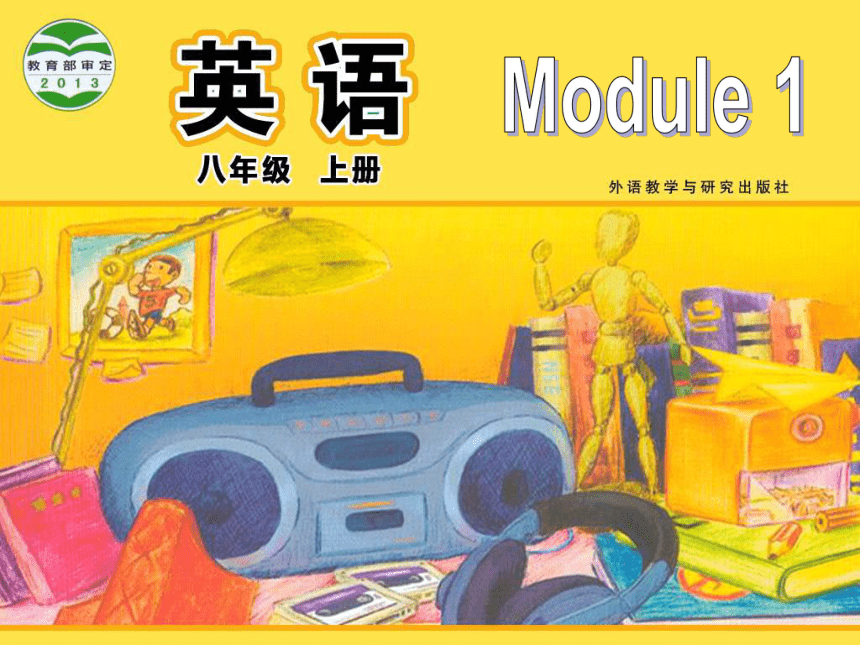
|
|
| 格式 | zip | ||
| 文件大小 | 7.8MB | ||
| 资源类型 | 教案 | ||
| 版本资源 | 外研版 | ||
| 科目 | 英语 | ||
| 更新时间 | 2017-11-28 00:00:00 | ||
图片预览

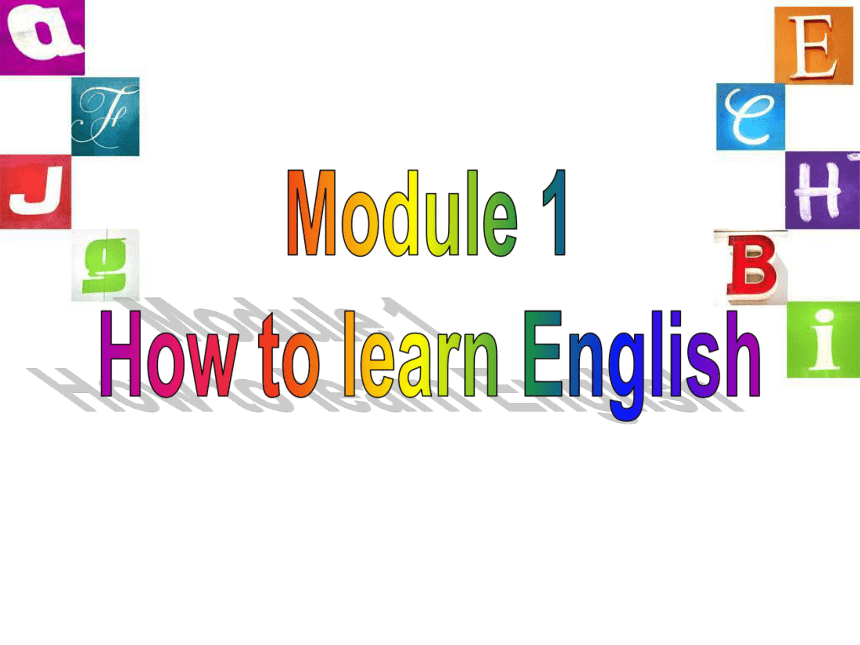
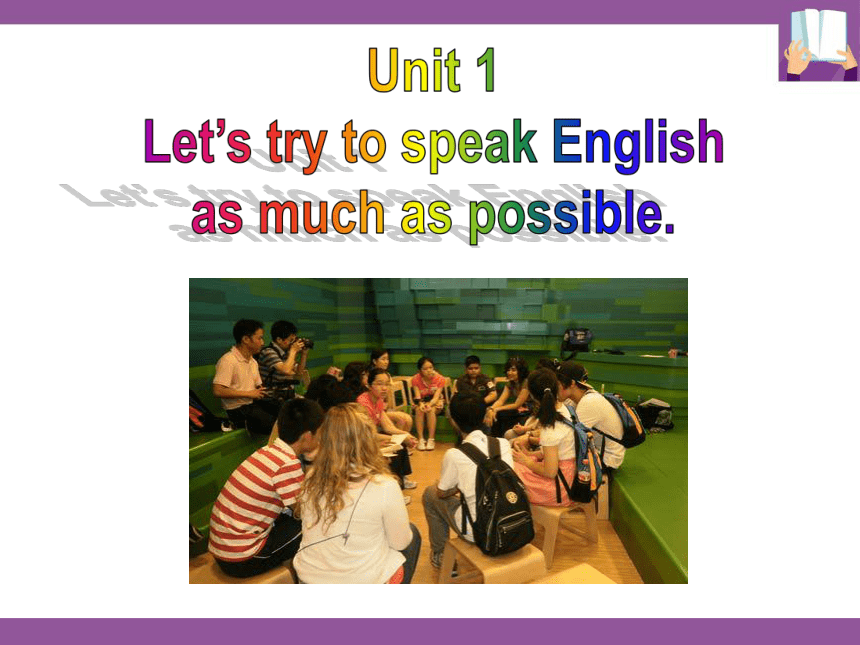

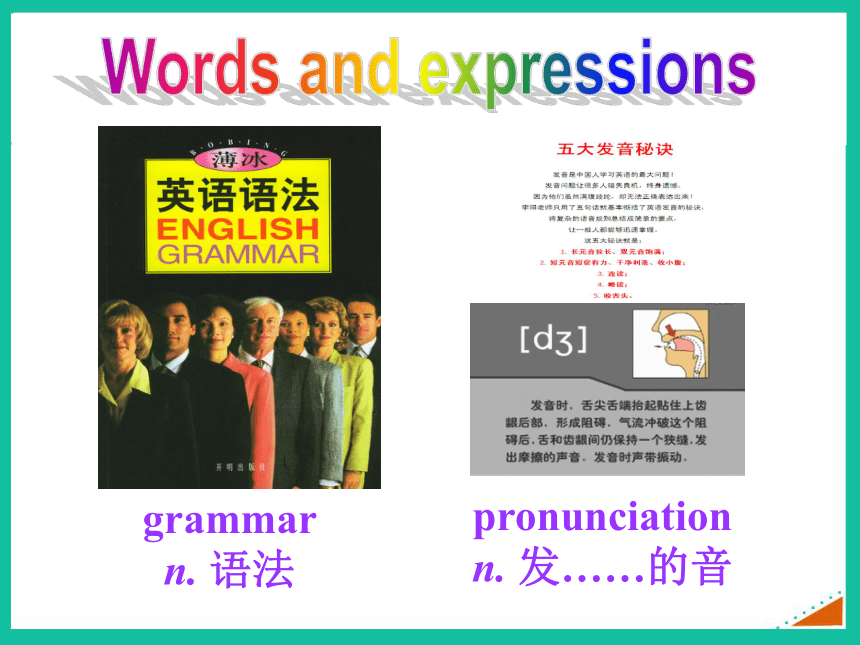
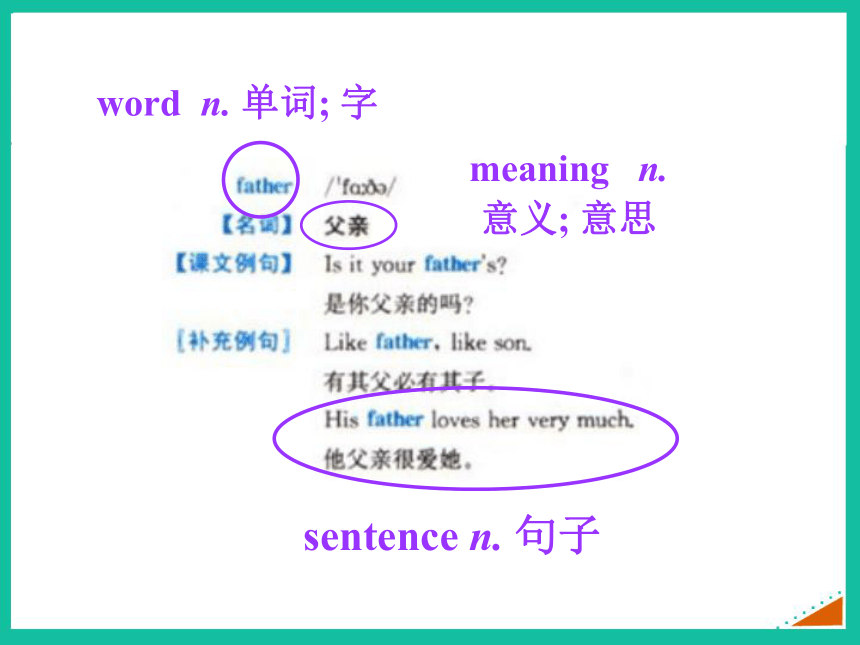
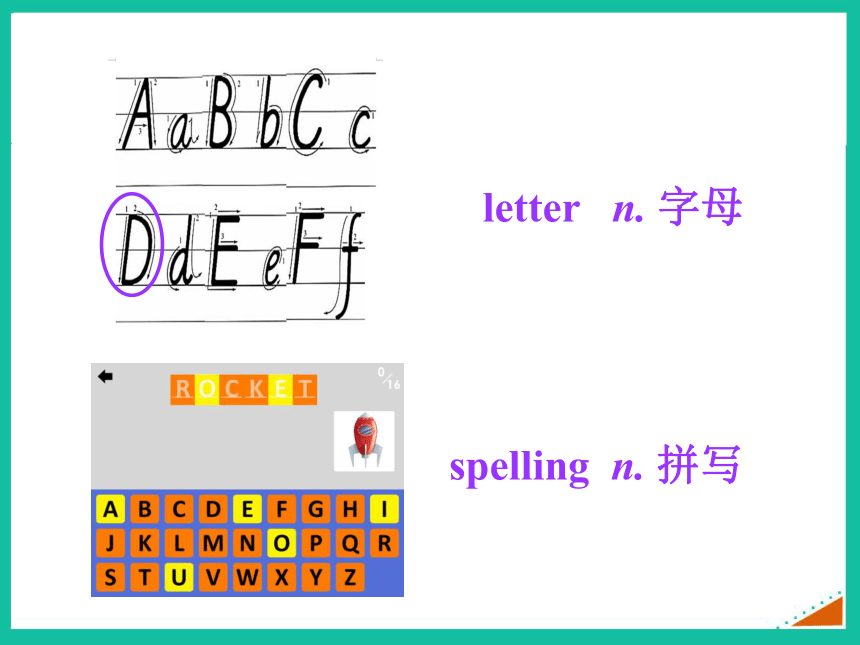
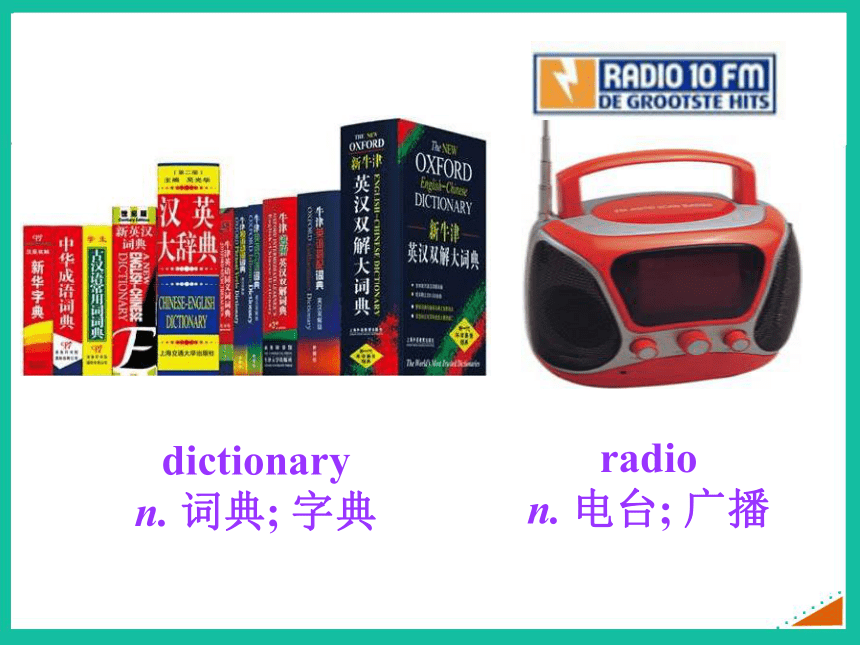




文档简介
课件67张PPT。Module 1Module 1
How to learn EnglishUnit 1
Let’s try to speak English
as much as possible.How to learn English well? ListeningSpeakingReadingWritinglettervocabularysentencegrammarpronunciationspellinggrammar
n. 语法pronunciation
n. 发……的音Words and expressionsword n. 单词; 字sentence n. 句子meaning n.
意义; 意思letter n. 字母spelling n. 拼写dictionary
n. 词典; 字典radio
n. 电台; 广播pair n. 两个人, 一对儿The newly married couple are really a happy pair. 那对新婚夫妇真是快乐的一对。 notebook
n. 笔记本agree with sb. 同意某人I really agree with you. 我非常赞同你的观点。mistake n. 错误; 过错Sorry, I make a mistake.
对不起, 我错了。But some mistakes are hard to correct.
但有些错误很难纠正。correct v. 改正; 纠正look …up 查; 查找You can look up this word in the dictionary. 你可以在字典里查这个词。 Your answer to the question is correct. 你对这个问题的回答是正确的。 correct adj. 正确的; 对的Jack practises the piano every day.
杰克每天练习弹钢琴。practise v. 练习I don’t understand what you are talking about.
我不明白你在说什么。understand-understood
v. 理解; 明白advice n. 意见; 建议You should give it a try. 你应该试一试。 should v. aux. 应该Is it possible to fix my computer?
我的电脑能修好吗?I will never forget it.
我将永远不会忘记。possible adj. 可能的forget-forgot v. 忘; 忘记He practises reading aloud every morning. 他每天早晨练习朗读。 The key factor to success is hard work. 成功的关键因素是努力工作。 aloud adv. 大声地; 出声地key adj. 关键性的, 非常重要的We can sum up the main point of the lesson in three sentences. 我们可以用三句话来概括本课要点。 She is an excellent teacher. 她是一位出色的教师。 main adj. 主要的; 最大的excellent adj. 极好的; 优秀的Listening
and
vocabularyRead the instructions and check (√) the ones you understand.
1. Work in pairs. Ask and answer the
questions.
2. Correct the spelling.
3. Listen and check the words you hear.
4. Practise saying the words.
5. Match the words with their meanings.
6. Complete the sentences with the
words in the box.Listen and answer the questions. Use the words and expressions in the box. dictionary grammar letter look up
make a mistake understand1. Which word did Daming not understand?He didn’t understand the word “spring”.2. What mistake did Lingling make?
3. How does Daming usually check the spelling of a word?
4. Why was it difficult for Daming to check the spelling of cinema?She made a grammar mistake. She said “go” instead of “went”.He looks it up in the dictionary.Because he didn’t know the first letter.We should always speak English in class.Let’s talk about good ways to learn English.write down our mistakes in our notebooksWrite down the correct answers next to the mistakesIt’s a good idea to spell and pronounce new words aloud every day.Listen to the radio or read English storiesFind some English pen friends and write to them.Listen and readListening: listen to the radio
Speaking:
Reading:
always speak English in class/try to speak English as much as possible; listen to the radioNow write notes about learning English. just need to understand key
words and main ideas; read English
stories try to find some English pen friends and write to them
spell and
pronounce new words aloud every dayLearning new words: Writing: Everyday EnglishReady?
That’s a good idea.
What else?
Thanks a lot.
Excellent!1. Practise saying the words.
practise v. “练习”
e.g. John is practising tennis in the
playground.
Peter likes basketball very much.
He practises it every day.
后可跟名词、代词或____________作宾语。动词-ing形式【运用】根据句意从括号内选出一个适
当形式补全句子。
Simon is practising ________ (to speak
/ speaking) English in the classroom.speaking2. Well, I usually look it up in the dictionary.
look up是动词短语,表示“查;查找”。
e.g. Please look up the time of your plane. = Please look the time of your plane up.
If you don’t know the word, you can
look it up in the dictionary.
如果宾语为_____,可放在up前或后;如果宾语为_____,只能放在look与up之间。名词代词根据汉语意思完成英语句子。
我在这本书里查不到这个新单词。我想试着在那本书里查找它。
I can’t ____________________ in this
book. I would like to try to __________
in that book.look it uplook up the new word3. Who has some advice?
advice “意见;建议”,是不可数名词,没有复数形式。“一条建议” a / one piece of?advice;“两条建议” two pieces of?advice;“一些建议” some advice;“许多建议” lots of / a lot of / much advice。如:
I wonder if I can get some advice from you.
Let me give you a piece of advice.【运用】单项选择。
Please give me some ______ on how to learn English well.
A. plan??????
B. information?????? ??
C. adviceC 4. Why not write down our mistakes in our notebooks?
Why not ...??用来表示提出建议,“为什么不……呢?;……怎么样呢?”。
e.g. Why not ask somebody else?
Why not write a note and put it up
on the wall?
Why not后接_________。动词原形【运用】单项选择。
—I hear there’s a good French restaurant nearby. Why not ______ there for lunch?
—Yeah, let’s go.
A. go???????? B. going?????? C. to goA 我们还可以用下面的表达方式来提建议:
Why don’t we drive to the country?
我们为什么不开车去乡下?
What/How about going to Europe for a holiday? 去欧洲度假怎么样?write down“写下;记下”,由“动词+副词”构成。用法同look up相同,如:
The telephone number is very important. You should write it down.
Please write your name down on the paper. /
Please write down your name on the paper.【运用】汉译英。
你何不在错误的旁边写下正确的拼写呢?Why don’t you write down the correct spelling next to the mistake?/
Why not write the correct spelling down next to the mistake?5. And don’t forget to write down the correct answers next to the mistakes. What else?
forget用作动词, “忘; 忘记”。
forget to do sth. “忘记要做某事(未 做)”。如:
I forgot to close the window yesterday. forget doing sth. “忘记做过某事(已做)”。
如:
My mother forgot giving me a watch as a
birthday present last year.
【运用】根据句意用适当形式填空。
1) Don’t forget _______ (take) your mobile
phone when you go shopping.
2) Amy forgot _______ (tell) me the news yesterday, so she told me again this morning.tellingto takeelse通常用在疑问词后面, 可以表示“另外的, 别的”。如:
We have said we’re sorry. What else
can we say?
___________________________________
If I can’t trust you, who else can I trust?
___________________________________我们已经道过歉了, 还能说些什么呢?如果不能相信你, 我还能相信谁呢?6. How about listening to the radio?
How / What about ...? “……怎么样?”,常用来提出建议或征求意见,其后常接名词、代词或动词-ing形式等。答语一般为“Good idea!”,“Excellent!”,“OK!”等。
【运用】Ⅰ.?词汇。
It is quite fine today! How about ______ (go)
climbing this afternoon?goingⅡ.?单项选择。
1. —I feel stressed from time to time. Could
you give me some advice?
?? —______ sharing your worries with your
parents?
A. Why don’t you ? ? ? ? B. How about
C. Why not ? ? ? ? ? ? ? ? ? ?D. Would you like
2. —What about having a drink? —______.
A. Help yourself?? ?????? ??B. Never mind
C. You’re right ? ? ? ? ? ? ?D. Good ideaDB7. I agree with you.
agree v. “赞同”。
agree with sb. “同意某人”。如:
I agree with you, Dad.
agree to do sth.意为“同意做某事”。如:
David agreed to have lunch in that
restaurant.【运用】根据汉语意思完成英语句子,
每空一词。
1) 我总是同意西蒙。
I always ______ _____ Simon.
2) 昨天他们同意再见面。
Yesterday they _______ ____ meet
again.agreed toagree with?Here is my (1) advice / notebook on learning English. Speak English (2) always / as much as possible in class, and listen to English (3) in the newspaper / on the radio. Underline the correct words and expressions.I (4) agree / forget it is a good idea to look up new words in the ( 5) notebook / dictionary. You can find the (6) correct / excellent pronunciation and learn the meaning.Pronunciation
and speaking1. We should always speak English in class.
2. Let’s try to speak English as much as
possible.
3. Why not write down our mistakes in our
notebooks?
4. It’s a good idea to spell and pronounce
new words aloud.
5. How about listening to the radio?
Now listen again and repeat.Listen and mark the intonation.Talk about problems in learning English and give advice.
Problems Advice
I can’t… How / What about …?
I don’t know… Why don’t you / not…?Work in pairs.— I can’t speak English well. What should
I do?
— Why don’t you try to talk to our
classmates in English?Ⅰ.?根据句意及提示补全所缺单词。
1. That sentence is so long that we can’t u_________ it.
2. His uncle gave us some a_____ on how to learn English well.
3. I think it is p______ for us to travel to the moon in the future.possibleunderstand?advice4. He can play the piano well, because he p_______ playing it every day.
5. My teacher asked me to c______ the mistakes in my homework.correctpracticesⅡ.?根据句意及提示写出所缺单词。
1. Mr Brown bought three ___________ (词典) from the bookstore yesterday.
2. Mike often teaches me to __________ (发……的音) English words.
3. How many ______ (字母) are there in the long word?
4. Tony ______ (忘记) to do his homework last night.
5. Some boy students often make _______ (拼写) mistakes.spellingdictionariespronounceletters ?forgotⅢ.?根据语境填上恰当的介词。
1. Mr Smith asked us to match the words ____ their meanings.
2. The students are working ____ pairs to answer the questions.
3. Why is it difficult ____ Mike to learn maths well?
4. Listen! They are talking _____ good ways to learn English.withinforabout5. David often writes down what he reads ____ his notebook.
6. Jack knows a lot _____ the world through reading.
7. My cousin writes ____ his pen friend in?England?once a week.
8. Listening to the radio is good ____ our pronunciation.forinabouttoⅣ.?根据意思完成句子。?
1.?他不知道那个单词的意思,因此他查了词典。
He didn’t know the meaning of that word, so he ______ ______ ______ in the dictionary.
2.?很抱歉我刚才犯了一个错误。
I’m terribly sorry I _____ _____ _______ just now.looked it upmade a mistake3.?黑板上有几个句子,请把它们写下来。
There are several sentences on the blackboard. Please ______ ______ ______.
4.?怀特先生不同意我们的意见。
Mr White didn’t ______ ______ ______.
5.?我爸爸叫我尽量多练习英语。
My father asks me to practise English ______ ______ ______ _______.as much as possible write them downagree with usⅤ.?根据对话内容,填入恰当的句子。
A: Do you like English?
B: (1) ___________________. I practise speaking it every day.?
A: What do you find difficult in learning English?
B: (2) _________________________. Could you give me some advice?
A: Have you got a radio??find listening really difficult?Sure, I do / Yes, I doB: (3) ___________.
A: Why not listen to English programmes on the radio? That’s good for your listening.?
B: (4) _____________________________.
A: It’s also a good idea to watch English films on TV.
B:? Great! (5) _______________. Thank you.
A: You are welcome.?I agree with youYes, I have?Oh, that’s a good idea / Good ideaWrite a letter to your friend and tell him/her some good ways about learning English.
How to learn EnglishUnit 1
Let’s try to speak English
as much as possible.How to learn English well? ListeningSpeakingReadingWritinglettervocabularysentencegrammarpronunciationspellinggrammar
n. 语法pronunciation
n. 发……的音Words and expressionsword n. 单词; 字sentence n. 句子meaning n.
意义; 意思letter n. 字母spelling n. 拼写dictionary
n. 词典; 字典radio
n. 电台; 广播pair n. 两个人, 一对儿The newly married couple are really a happy pair. 那对新婚夫妇真是快乐的一对。 notebook
n. 笔记本agree with sb. 同意某人I really agree with you. 我非常赞同你的观点。mistake n. 错误; 过错Sorry, I make a mistake.
对不起, 我错了。But some mistakes are hard to correct.
但有些错误很难纠正。correct v. 改正; 纠正look …up 查; 查找You can look up this word in the dictionary. 你可以在字典里查这个词。 Your answer to the question is correct. 你对这个问题的回答是正确的。 correct adj. 正确的; 对的Jack practises the piano every day.
杰克每天练习弹钢琴。practise v. 练习I don’t understand what you are talking about.
我不明白你在说什么。understand-understood
v. 理解; 明白advice n. 意见; 建议You should give it a try. 你应该试一试。 should v. aux. 应该Is it possible to fix my computer?
我的电脑能修好吗?I will never forget it.
我将永远不会忘记。possible adj. 可能的forget-forgot v. 忘; 忘记He practises reading aloud every morning. 他每天早晨练习朗读。 The key factor to success is hard work. 成功的关键因素是努力工作。 aloud adv. 大声地; 出声地key adj. 关键性的, 非常重要的We can sum up the main point of the lesson in three sentences. 我们可以用三句话来概括本课要点。 She is an excellent teacher. 她是一位出色的教师。 main adj. 主要的; 最大的excellent adj. 极好的; 优秀的Listening
and
vocabularyRead the instructions and check (√) the ones you understand.
1. Work in pairs. Ask and answer the
questions.
2. Correct the spelling.
3. Listen and check the words you hear.
4. Practise saying the words.
5. Match the words with their meanings.
6. Complete the sentences with the
words in the box.Listen and answer the questions. Use the words and expressions in the box. dictionary grammar letter look up
make a mistake understand1. Which word did Daming not understand?He didn’t understand the word “spring”.2. What mistake did Lingling make?
3. How does Daming usually check the spelling of a word?
4. Why was it difficult for Daming to check the spelling of cinema?She made a grammar mistake. She said “go” instead of “went”.He looks it up in the dictionary.Because he didn’t know the first letter.We should always speak English in class.Let’s talk about good ways to learn English.write down our mistakes in our notebooksWrite down the correct answers next to the mistakesIt’s a good idea to spell and pronounce new words aloud every day.Listen to the radio or read English storiesFind some English pen friends and write to them.Listen and readListening: listen to the radio
Speaking:
Reading:
always speak English in class/try to speak English as much as possible; listen to the radioNow write notes about learning English. just need to understand key
words and main ideas; read English
stories try to find some English pen friends and write to them
spell and
pronounce new words aloud every dayLearning new words: Writing: Everyday EnglishReady?
That’s a good idea.
What else?
Thanks a lot.
Excellent!1. Practise saying the words.
practise v. “练习”
e.g. John is practising tennis in the
playground.
Peter likes basketball very much.
He practises it every day.
后可跟名词、代词或____________作宾语。动词-ing形式【运用】根据句意从括号内选出一个适
当形式补全句子。
Simon is practising ________ (to speak
/ speaking) English in the classroom.speaking2. Well, I usually look it up in the dictionary.
look up是动词短语,表示“查;查找”。
e.g. Please look up the time of your plane. = Please look the time of your plane up.
If you don’t know the word, you can
look it up in the dictionary.
如果宾语为_____,可放在up前或后;如果宾语为_____,只能放在look与up之间。名词代词根据汉语意思完成英语句子。
我在这本书里查不到这个新单词。我想试着在那本书里查找它。
I can’t ____________________ in this
book. I would like to try to __________
in that book.look it uplook up the new word3. Who has some advice?
advice “意见;建议”,是不可数名词,没有复数形式。“一条建议” a / one piece of?advice;“两条建议” two pieces of?advice;“一些建议” some advice;“许多建议” lots of / a lot of / much advice。如:
I wonder if I can get some advice from you.
Let me give you a piece of advice.【运用】单项选择。
Please give me some ______ on how to learn English well.
A. plan??????
B. information?????? ??
C. adviceC 4. Why not write down our mistakes in our notebooks?
Why not ...??用来表示提出建议,“为什么不……呢?;……怎么样呢?”。
e.g. Why not ask somebody else?
Why not write a note and put it up
on the wall?
Why not后接_________。动词原形【运用】单项选择。
—I hear there’s a good French restaurant nearby. Why not ______ there for lunch?
—Yeah, let’s go.
A. go???????? B. going?????? C. to goA 我们还可以用下面的表达方式来提建议:
Why don’t we drive to the country?
我们为什么不开车去乡下?
What/How about going to Europe for a holiday? 去欧洲度假怎么样?write down“写下;记下”,由“动词+副词”构成。用法同look up相同,如:
The telephone number is very important. You should write it down.
Please write your name down on the paper. /
Please write down your name on the paper.【运用】汉译英。
你何不在错误的旁边写下正确的拼写呢?Why don’t you write down the correct spelling next to the mistake?/
Why not write the correct spelling down next to the mistake?5. And don’t forget to write down the correct answers next to the mistakes. What else?
forget用作动词, “忘; 忘记”。
forget to do sth. “忘记要做某事(未 做)”。如:
I forgot to close the window yesterday. forget doing sth. “忘记做过某事(已做)”。
如:
My mother forgot giving me a watch as a
birthday present last year.
【运用】根据句意用适当形式填空。
1) Don’t forget _______ (take) your mobile
phone when you go shopping.
2) Amy forgot _______ (tell) me the news yesterday, so she told me again this morning.tellingto takeelse通常用在疑问词后面, 可以表示“另外的, 别的”。如:
We have said we’re sorry. What else
can we say?
___________________________________
If I can’t trust you, who else can I trust?
___________________________________我们已经道过歉了, 还能说些什么呢?如果不能相信你, 我还能相信谁呢?6. How about listening to the radio?
How / What about ...? “……怎么样?”,常用来提出建议或征求意见,其后常接名词、代词或动词-ing形式等。答语一般为“Good idea!”,“Excellent!”,“OK!”等。
【运用】Ⅰ.?词汇。
It is quite fine today! How about ______ (go)
climbing this afternoon?goingⅡ.?单项选择。
1. —I feel stressed from time to time. Could
you give me some advice?
?? —______ sharing your worries with your
parents?
A. Why don’t you ? ? ? ? B. How about
C. Why not ? ? ? ? ? ? ? ? ? ?D. Would you like
2. —What about having a drink? —______.
A. Help yourself?? ?????? ??B. Never mind
C. You’re right ? ? ? ? ? ? ?D. Good ideaDB7. I agree with you.
agree v. “赞同”。
agree with sb. “同意某人”。如:
I agree with you, Dad.
agree to do sth.意为“同意做某事”。如:
David agreed to have lunch in that
restaurant.【运用】根据汉语意思完成英语句子,
每空一词。
1) 我总是同意西蒙。
I always ______ _____ Simon.
2) 昨天他们同意再见面。
Yesterday they _______ ____ meet
again.agreed toagree with?Here is my (1) advice / notebook on learning English. Speak English (2) always / as much as possible in class, and listen to English (3) in the newspaper / on the radio. Underline the correct words and expressions.I (4) agree / forget it is a good idea to look up new words in the ( 5) notebook / dictionary. You can find the (6) correct / excellent pronunciation and learn the meaning.Pronunciation
and speaking1. We should always speak English in class.
2. Let’s try to speak English as much as
possible.
3. Why not write down our mistakes in our
notebooks?
4. It’s a good idea to spell and pronounce
new words aloud.
5. How about listening to the radio?
Now listen again and repeat.Listen and mark the intonation.Talk about problems in learning English and give advice.
Problems Advice
I can’t… How / What about …?
I don’t know… Why don’t you / not…?Work in pairs.— I can’t speak English well. What should
I do?
— Why don’t you try to talk to our
classmates in English?Ⅰ.?根据句意及提示补全所缺单词。
1. That sentence is so long that we can’t u_________ it.
2. His uncle gave us some a_____ on how to learn English well.
3. I think it is p______ for us to travel to the moon in the future.possibleunderstand?advice4. He can play the piano well, because he p_______ playing it every day.
5. My teacher asked me to c______ the mistakes in my homework.correctpracticesⅡ.?根据句意及提示写出所缺单词。
1. Mr Brown bought three ___________ (词典) from the bookstore yesterday.
2. Mike often teaches me to __________ (发……的音) English words.
3. How many ______ (字母) are there in the long word?
4. Tony ______ (忘记) to do his homework last night.
5. Some boy students often make _______ (拼写) mistakes.spellingdictionariespronounceletters ?forgotⅢ.?根据语境填上恰当的介词。
1. Mr Smith asked us to match the words ____ their meanings.
2. The students are working ____ pairs to answer the questions.
3. Why is it difficult ____ Mike to learn maths well?
4. Listen! They are talking _____ good ways to learn English.withinforabout5. David often writes down what he reads ____ his notebook.
6. Jack knows a lot _____ the world through reading.
7. My cousin writes ____ his pen friend in?England?once a week.
8. Listening to the radio is good ____ our pronunciation.forinabouttoⅣ.?根据意思完成句子。?
1.?他不知道那个单词的意思,因此他查了词典。
He didn’t know the meaning of that word, so he ______ ______ ______ in the dictionary.
2.?很抱歉我刚才犯了一个错误。
I’m terribly sorry I _____ _____ _______ just now.looked it upmade a mistake3.?黑板上有几个句子,请把它们写下来。
There are several sentences on the blackboard. Please ______ ______ ______.
4.?怀特先生不同意我们的意见。
Mr White didn’t ______ ______ ______.
5.?我爸爸叫我尽量多练习英语。
My father asks me to practise English ______ ______ ______ _______.as much as possible write them downagree with usⅤ.?根据对话内容,填入恰当的句子。
A: Do you like English?
B: (1) ___________________. I practise speaking it every day.?
A: What do you find difficult in learning English?
B: (2) _________________________. Could you give me some advice?
A: Have you got a radio??find listening really difficult?Sure, I do / Yes, I doB: (3) ___________.
A: Why not listen to English programmes on the radio? That’s good for your listening.?
B: (4) _____________________________.
A: It’s also a good idea to watch English films on TV.
B:? Great! (5) _______________. Thank you.
A: You are welcome.?I agree with youYes, I have?Oh, that’s a good idea / Good ideaWrite a letter to your friend and tell him/her some good ways about learning English.
同课章节目录
- Module 1 How to learn English
- Unit 1 Let's try to speak English as much as possi
- Unit 2 You should smile at her.
- Unit 3 Language in use .
- Module 2 My home town and my country
- Unit 1 It's taller than many other buildings.
- Unit 2 Cambridge is a beautiful city in the east o
- Unit 3 Language in use .
- Module 3 Sports.
- Unit 1 Nothing is more exciting than playing tenni
- Unit 2 This year we training more carefully.
- Unit 3 Language in use .
- Module 4 Planes, ships and trains .
- Unit 1 He lives the farthest from school.
- Unit 2 What is the best way to travel.
- Unit 3 Language in use .
- Module 5 Lao She Teahouse.
- Unit 1 I wanted to see the Beijing Opera.
- Unit 2 It descibes the changes in Chinese society.
- Unit 3 Language in use .
- Module 6 Animals in danger.
- Unit 1 It allows people to get closer to them .
- Unit 2 The WWF is working hard to save them all.
- Unit 3 Language in use .
- Revision module A
- Module 7 A famous story
- Unit 1 Alice was sitting with her sister by the ri
- Unit 2 She was thinking about her cat.
- Unit 3 Language in use .
- Module 8 Accidents
- Unit 1 While the car were changing to red, a car s
- Unit 2 I was trying to pick it up when it bite me
- Unit 3 Language in use .
- Module 9 Population
- Unit 1 The population of China is about 1.37 billi
- Unit 2 Arnwick was a city with 200,000 people.
- Unit 3 Language in use .
- Module 10 The weathe
- Unit 1 It might snow.
- Unit 2 The weather is fine all year round.
- Unit 3 Language in use .
- Module 11 Way of life
- Unit 1 In China ,we open a gift later.
- Unit 2 In England, you usually drink tea with milk
- Unit 3 Language in use .
- Module 12 Help
- Unit 1 What should we do before help arrives?
- Unit 2 Stay away from windows and heavy furniture.
- Unit 3 Language in use .
- Revision module B
